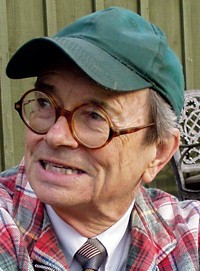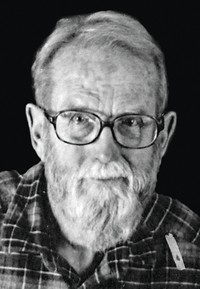Advertisement
Grab your lab coat. Let's get started
Welcome!
Welcome!
Create an account below to get 6 C&EN articles per month, receive newsletters and more - all free.
It seems this is your first time logging in online. Please enter the following information to continue.
As an ACS member you automatically get access to this site. All we need is few more details to create your reading experience.
Not you? Sign in with a different account.
Not you? Sign in with a different account.
ERROR 1
ERROR 1
ERROR 2
ERROR 2
ERROR 2
ERROR 2
ERROR 2
Password and Confirm password must match.
If you have an ACS member number, please enter it here so we can link this account to your membership. (optional)
ERROR 2
ACS values your privacy. By submitting your information, you are gaining access to C&EN and subscribing to our weekly newsletter. We use the information you provide to make your reading experience better, and we will never sell your data to third party members.
People
Obituaries
by Susan J. Ainsworth
October 20, 2008
| A version of this story appeared in
Volume 86, Issue 42
Allen H. Bartel, 85, professor emeritus of biochemical and biophysical sciences at the University of Houston, died on Aug. 31 in Boulder, Colo.
Born in San Diego, Bartel received a B.S. in physics, an M.S. in entomology, and a Ph.D. in insect biochemistry and physiology, all from the University of California, Berkeley. After completing his doctorate in 1954, he did postdoctoral work at UC Santa Barbara and California Institute of Technology.
In 1958, he became a professor of biology and biochemistry at the University of Houston, where he remained until his retirement in 1991.
Bartel was instrumental in establishing the university's biophysical sciences program, which combined the fields of biology, physics, and chemistry. The program became an official department of the university in 1964 before merging with the university's biochemistry and biology departments to become the department of biology and biochemistry.
Bartel was an emeritus member of ACS, joining in 1953.
He is survived by his wife of 56 years, Jane; four children; and eight grandchildren.
Joel N. Bloom, 83, a pioneering past director and president of the Science Museum and Fels Planetarium of the Franklin Institute, in Philadelphia, died in Livingston, N.J., on Sept. 23 after a long illness.
Bloom was born in New York City and earned a bachelor's degree in chemical engineering from the Polytechnic Institute of Brooklyn (now the Polytechnic Institute of New York University) in 1949 and a master's degree in operations research from Columbia University in 1954.
In 1958, he accepted a job as director of the systems science division of the Franklin Institute Research Laboratories.
In 1969, he was named director of the institute's science museum. He had a passion for using science museums to further public science education and introduced dynamic exhibits that included hands-on science experiments. In the 1980s, Bloom raised money to refurbish the museum's facilities and exhibits. He retired in 1990. In 2002, the Franklin Institute named its newly renovated observatory the Joel N. Bloom Observatory.
Bloom is survived by three children and six grandchildren. His wife, Paula, died in 2006.
John F. Pudvin, 88, a retired Bell Laboratories chemist, died on Aug. 10.
Born in Grand Island, N.Y., Pudvin earned a bachelor's degree in chemistry from the State University of New York, Buffalo. He was then drafted into the Army and assigned to serve in the technical service unit and special engineer detachment under the Manhattan Project in Oak Ridge, Tenn.
After the war, Pudvin returned to SUNY Buffalo, where he worked as a physics professor and earned a Ph.D. in inorganic chemistry in 1948.
In 1952, Pudvin relocated his family to Bethlehem, Pa., and began a long career with Bell Labs. As a supervisor in the company's Specifications & Technical Information Group, he specialized in the management of research programs aimed at the development and evaluation of materials and chemical procedures for semiconductor devices. After his retirement in 1982, Pudvin and his wife, Ruth, moved to Sarasota, Fla.
An emeritus member, Pudvin joined ACS in 1941.
Pudvin is survived by his wife of 63 years and two daughters.
B. Patrick Sullivan, 58, professor of chemistry at the University of Wyoming, died unexpectedly on July 31 in Laramie, Wyo.
Born in Brookings, S.D., Sullivan earned a B.S. degree in the biological sciences from UC Irvine and an M.S. degree in inorganic chemistry from UCLA before completing his Ph.D. in inorganic chemistry under Thomas J. Meyer at the University of North Carolina, Chapel Hill, in 1989.
Sullivan served as a research professor at UNC and as a visiting associate in chemistry at California Institute of Technology before joining the chemistry faculty at the University of Wyoming in 1990. He was promoted to the rank of professor in 1999.
Sullivan continued to pursue his interests in the development and application of photoexcited states of polypyridyl complexes of ruthenium, osmium, and rhenium. This work included developing chemical sensor applications and probing the molecular environment within thin films and similar structures, as well as continued development of photochemical energy conversion systems.
In recent years, Sullivan's research group developed novel linear oligomeric diphosphine-bridged complexes of rhenium(I), explored the coordination and electronic properties of new carboranyl phosphine ligands, and devised synthetic routes to coordination-complex-based molecular squares and arrays.
Most recently, in collaboration with workers at Pacific Northwest National Laboratory, Sullivan reported new highly oxidizing excited states of rhenium and technetium that formed the basis for the Department of Energy-funded research that he was conducting at the time of his death. He joined ACS in 1979.
Sullivan was a nature photographer whose photos were exhibited in a number of galleries in the western U.S.
He is survived by his wife, Beverly; two daughters, Jolie and Tara; and two grandchildren.
Gordon M. Tener, 80, professor emeritus of biochemistry and molecular biology at the University of British Columbia, in Vancouver, died on Sept. 7 after developing a malignant brain tumor.
A native of Vancouver, Tener earned a Ph.D. in biochemistry at the University of Wisconsin, Madison, in 1953. He conducted postdoctoral research at the University of Paris and the University of Auckland, in New Zealand. For several decades, he served as a professor of biochemistry at the University of British Columbia.
Tener participated in the early days of genetic research, working alongside scientists including Jack Campbell; Gordon Shrum; Ian Gillam; H. Gobind Khorana, who won the Nobel Prize in Physiology or Medicine in 1968; and Michael Smith, who won the Nobel Prize in Chemistry in 1993. Tener retired from the university in 1993.
He was an emeritus member of ACS, joining in 1951.
In retirement, Tener found great enjoyment in cruising the coastal waters of British Columbia in his sailboats and motorboat.
He is survived by two sisters, Doreen Chutter and Kathleen Shea; and two brothers, John and Robert. Tener is predeceased by another brother, David.
Obituaries are written by Susan J. Ainsworth. Obituary notices may be sent to s_ainsworth@acs.org and should include a detailed educational and professional history.





Join the conversation
Contact the reporter
Submit a Letter to the Editor for publication
Engage with us on Twitter